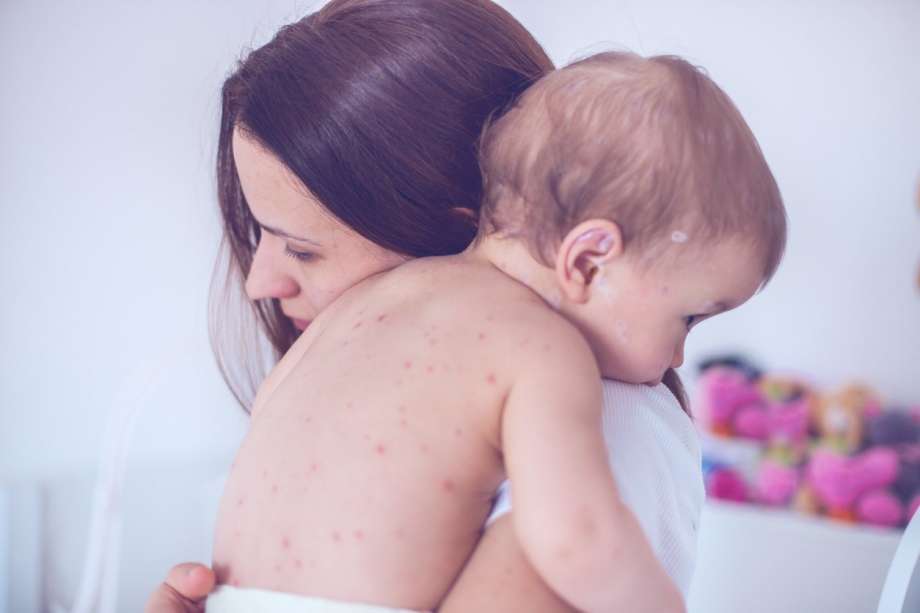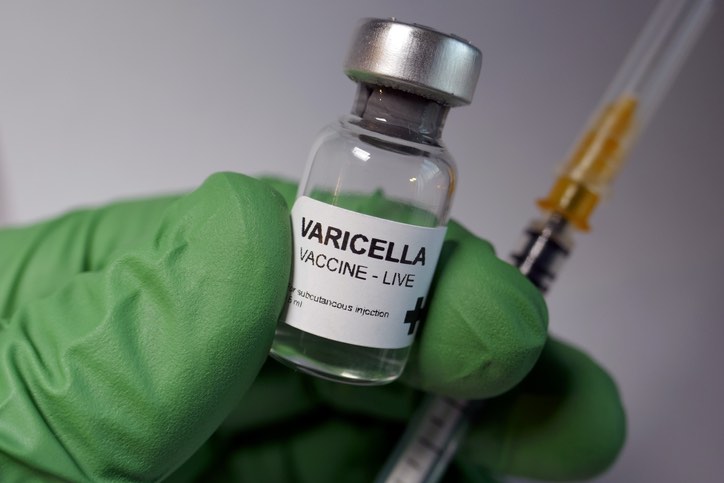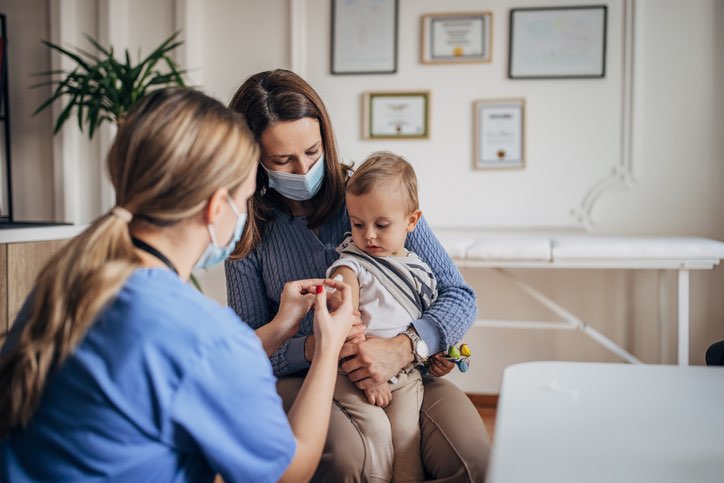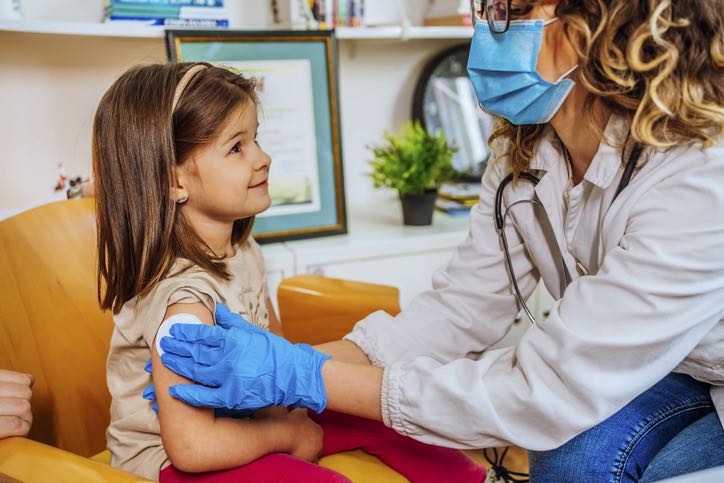What Is the Ideal Chickenpox Vaccine Age?

Before the Varicella vaccine was introduced to the US immunization schedule in 1995, Chickenpox was a common illness among children. The severity of the disease caused hospitalizations and even deaths. The Chickenpox vaccination has reduced the number of infections annually.
This article provides information about what the chickenpox vaccine is, the recommended, universal age to administer the chickenpox vaccine to children, and the benefits of doing so before the age of 12.
What is the Chickenpox (Varicella) Vaccine?

Chickenpox is an infectious disease that spreads by direct contact and through the air by sneezing and coughing. It is caused by the varicella-zoster virus (VZV). Signs of chickenpox include an itchy, blister-like rash that starts on the abdomen, chest, or back and spreads to the rest of the body.
There were 4 million cases of chickenpox each year before the US introduction of the vaccine in 1995. Among these cases, there were 10,500 to 13,000 hospitalizations and 100 to 150 deaths annually.
The first varicella vaccine was developed in Japan. Since the routine vaccination of varicella in the US, there has been a 97% decrease in chickenpox cases. The varicella vaccine works to prevent chickenpox (varicella) and protects against shingles. The vaccine is a weakened version of the virus – a live, attenuated vaccine. It causes your immune system to respond similarly to the actual virus but does not cause illness in healthy people.
What are the Different Types of Chickenpox Vaccines?
There are two chickenpox vaccines that are licensed in the US.
ProQuad® (MMRV) is a chickenpox vaccine that contains four vaccines (measles, mumps, rubella, and varicella). It can only be given to children aged 12 months through 12 years. It was made available in order to reduce the number of shots that children need to be protected from these diseases.
Varivax® is the other licensed chickenpox vaccine in the US. It contains only the chickenpox vaccine and can be administered to children aged 12 months and older including adolescents and adults.
It’s been shown that a single dose compared to two doses of Varivax® is 82% and 92% effective in protecting against chickenpox. Vaccinated individuals who do get an infection show very mild symptoms with fewer than 50 lesions.
A single dose of Varivax® has also been shown to be 98% effective in protection against severe effects of chickenpox such as over 500 lesions. Receiving two doses is 100% effective in preventing a severe case of chickenpox.
It is crucial for children to receive two doses to ensure full protection against severe chickenpox.
Are There Any Side Effects of the Vaccine?

Children may experience side effects after receiving the vaccine. Some of these include
- Soreness, rash, and redness in the area where the shot was given. This can last for several days but will go away on its own without treatment.
- Fever
- Tiredness
- Joint pain and stiffness
There is a risk of an allergic reaction to the vaccine. Symptoms include swollen face and neck, hives, dizziness, weakness, and difficulty breathing.
If your child has any of these symptoms following vaccination, please call 9–1–1 and get to the nearest hospital for immediate medical care.
There are certain people who should not receive the chickenpox vaccine. These include:
- Those who experienced a serious allergic reaction from a previous chickenpox vaccine
- Those who are allergic to a vaccine component, such as gelatin or neomycin
- Those who have a fever or current infection
- Those who are pregnant
- Those who are taking medications or have a medical condition that weakens their immune system
- Those who have untreated active tuberculosis (TB)
What is the Ideal Chickenpox Vaccine Age for a Child?

In 2006, the Advisory Committee on Immunization Practices (ACIP) to the Centers for Disease Control and Prevention (CDC) released recommendations for children aged 4–6 years (before kindergarten or first grade) to receive a second dose of varicella vaccine. It is recommended that children receive both doses of the chickenpox vaccination to ensure its effectiveness in protecting against the virus.
The CDC has the following chickenpox vaccine recommendations for children under 13 years of age:
- First dose: 12 through 15 months of age
- Second dose: 4 through 6 years of age. (The second dose may be administered at an earlier age if it is given at least 3 months after the first dose).
- For those who are 13 years of age and older and have never had chickenpox or never have been vaccinated, the CDC recommends they receive both doses with a minimum of 28 days between the doses.
What are the Benefits of Receiving the Chickenpox Vaccine Before the Age of 12?
The main benefit of the chickenpox vaccine is the prevention of the disease, its symptoms, and complications. There are public health benefits in minimizing chickenpox outbreaks in a community. At a family level, getting vaccinated can give peace of mind and prevent the social and mental challenges that occur when a young child gets chickenpox.
Before the vaccine, children who had chickenpox had to stay home, experience the miserable symptoms, fight their urge to scratch their lesions, and miss about a week of school. Because a young child cannot stay home alone, parents had to scramble to find appropriate childcare or take time off work to tend to their children. Most childcare facilities have policies that state sick children are required to stay home. Some families cannot afford to miss a week of work, do not have sick pay or vacation days and struggle financially, putting a strain on their already stressful lives.
Because the virus is highly contagious, chickenpox can spread to others who have never had the disease or have never been vaccinated. This can put family members in the home or those who have close contact with the child at risk of contracting the disease. Those who may be at high risk for complications if they are infected with chickenpox include
- Infants
- Adolescents
- Adults
- Pregnant women
- People with weakened immune systems due to illnesses such as HIV/AIDS or cancer
- Patients who have had transplants
- People on chemotherapy, immunosuppressive medications, or long-term use of steroids.
Life-threatening complications of chickenpox occur more commonly among adults and those with compromised immune systems. Some of these include the following:
- Cerebellar ataxia (defective muscular coordination)
- Encephalitis (inflammation of the brain)
- Pneumonia (lung infections)
- Secondary bacterial infections
- Bleeding problems (hemorrhagic complications)
- Bloodstream infections (sepsis)
- Dehydration
- Transverse myelitis (inflammation along the spinal cord)
- Death
Due to the introduction of the vaccine program, deaths due to chickenpox complications are very rare. Deaths that do occur from chickenpox are of unvaccinated children and adults.
It’s important to speak to your pediatrician or healthcare provider about any concerns you may have about getting your child vaccinated.

